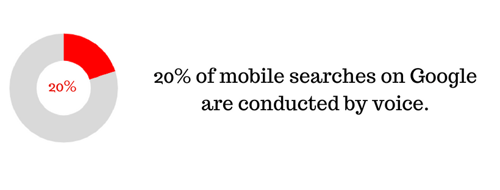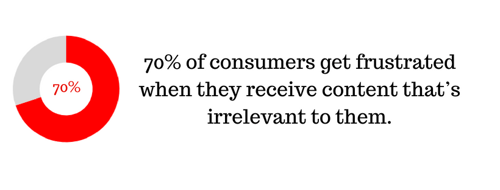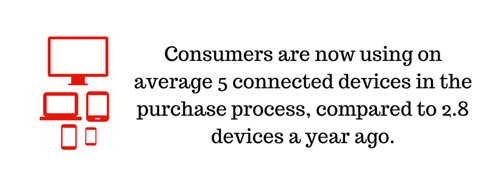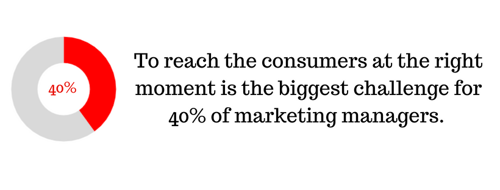Share this
How artificial intelligence transforms marketing
by Veronika Schipper on Aug 31, 2018 2:24:07 PM
.png?width=820&name=Copy%20of%20Copy%20of%20Congrats!%20(2).png)
The use of artificial intelligence is becoming more present in marketing as delivering a truly personalised experience is what consumers are requiring. Having more insight into consumer data and their behaviour helps marketers to focus more of their time on building strategies and executing their communication towards their audiences.
To meet consumer’s ever-growing expectations, companies should focus on investing in modern computing tools and enhance artificial intelligence. Those that are willing to do that are looking into growing their consumer engagement and increasing their ROI.

Conversational commerce
There is a big shift in the way consumers interact with brands. Over the past two years, businesses have dedicated lots of resources and time to build new conversational experiences such as chatbots or virtual assistants using artificial intelligence technology.
Chatbots, based on natural language processing, are the new online customer service tool. Consumers get the feeling that they can connect directly with their brand which boosts their brand experience. If well executed, chatbots can save consumers time searching for information resulting in higher consumer loyalty. Companies that offer chatbots as service benefit from cutting costs and creating a new way of collecting consumer data.
Voice powered devices such as Google Home or Amazon’s echo grow more capable to understand customer’s context. Speaking to a virtual assistant enables faster customer interactions and ease of use. With more mobile searches being conducted using voice no doubt that voice search will be the next big thing in marketing.

Hubspot
Real-time personalisation
Real-time personalisation is a powerful process that helps companies engage in more personalised conversations with consumers. Using machine learning, natural language processing and propensity modelling, marketers can easily adapt the tone of voice or visuals according to the consumer’s location, age or gender at the moment of their visit.
The better the artificial intelligence’ tools get, the more personalised the marketing message can be. By targeting audiences as individuals, brands can give their customers exactly what they want. That results in better customer interactions and less wastage.
Digital marketing specialist agency DigitasLBi
Identity resolution
Trying to reach the ideal audience in marketing is always challenging. Especially when there are multiple users in one household visiting your website from the same device or one user switching devices and using different channels to complete a purchase. Companies collect consumer data from CRM, cookies, clicks, third parties and try to identify an individual in all that mess so that they can target them in the best possible way.
Identity resolution provides a better way to use data. Using AI it is possible to connect customer behaviour, channels and devices in real-time and from each piece of data create a single consumer ID. This is then used for building more personalised and engaging experience.
Gartner
Marketing orchestration
Marketing orchestration is a strategy that allows marketing managers to interact with their audiences on any digital channel at the right moment of time. By collecting mass data from multiple touch points and applying artificial intelligence, companies can benefit from predictions on what the best time and channel is to send offers or other communication to their consumers.
Having a single customer identity defined, marketers can spend more time planning strategies and executing them rather than waste time on analysing data. The era of mass marketing campaigns is coming to an end as we are entering the age of personalisation and business that invest in these solutions will grow their consumer engagement and revenue.
Share this
- December 2025 (2)
- November 2025 (2)
- October 2025 (2)
- September 2025 (3)
- August 2025 (2)
- July 2025 (1)
- June 2025 (1)
- April 2025 (4)
- February 2025 (2)
- January 2025 (3)
- December 2024 (1)
- November 2024 (5)
- October 2024 (2)
- September 2024 (1)
- August 2024 (1)
- July 2024 (4)
- June 2024 (2)
- May 2024 (1)
- April 2024 (4)
- March 2024 (2)
- February 2024 (2)
- January 2024 (4)
- December 2023 (1)
- November 2023 (4)
- October 2023 (4)
- September 2023 (4)
- June 2023 (2)
- May 2023 (2)
- April 2023 (1)
- March 2023 (1)
- January 2023 (4)
- December 2022 (3)
- November 2022 (5)
- October 2022 (3)
- July 2022 (1)
- May 2022 (2)
- April 2022 (2)
- March 2022 (5)
- February 2022 (2)
- January 2022 (5)
- December 2021 (5)
- November 2021 (4)
- October 2021 (2)
- September 2021 (1)
- August 2021 (3)
- July 2021 (4)
- May 2021 (2)
- April 2021 (2)
- February 2021 (2)
- December 2020 (1)
- October 2020 (2)
- September 2020 (1)
- August 2020 (2)
- July 2020 (2)
- June 2020 (1)
- March 2020 (2)
- February 2020 (1)
- January 2020 (1)
- November 2019 (3)
- October 2019 (2)
- September 2019 (3)
- August 2019 (2)
- July 2019 (3)
- June 2019 (5)
- May 2019 (2)
- April 2019 (4)
- March 2019 (2)
- February 2019 (2)
- January 2019 (4)
- December 2018 (2)
- November 2018 (1)
- October 2018 (1)
- September 2018 (2)
- August 2018 (3)
- July 2018 (3)
- May 2018 (2)
- April 2018 (4)
- March 2018 (5)
- February 2018 (1)
- January 2018 (3)
- November 2017 (2)
- October 2017 (2)





